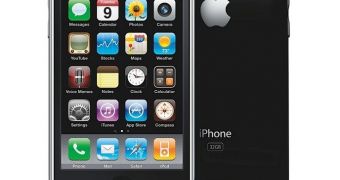The rumors regarding the possibility that Verizon would get the iPhone anytime soon should finally come to a rest. It seems that Apple's iconic device won't leave AT&T's airwaves this year or the next, as the exclusivity deal between the wireless carrier and the handset's maker extends all the way to 2012. In case there were some hoping otherwise, they will certainly be disappointed.
Rumors regarding the imminent end of that iPhone exclusivity deal between Apple and AT&T have been floating around for quite some time now, with many of them pointing towards a close launch of the device on Verizon's network, but it seems that we'll have to wait a little longer before that happens. Back in 2007, when the first gen iPhone was launched on the market, Apple and AT&T signed a five-year deal for the distribution of the device, at least this is what documents that Apple recently filed in California show.
The length of the exclusivity deal was officially unveiled during an ongoing California class-action lawsuit filed in 2007 against Apple and AT&T. According to a recent article on Engadget, the lawsuit alleges that the two companies “illegally exerted a monopoly over iPhone service” by stating that the required service contract for the iPhone was of 2 years, while the Apple - AT&T exclusivity deal extended for five. Those willing to continue using the iPhone would have “to re-up with AT&T for three years,” and cannot choose another carrier, the news site notes.
However, Apple states that the deal was officially unveiled, quoting an USA Today article from 2007: “The duration of the exclusive Apple-[AT&T] agreement was not 'secret' either. The [plaintiff] quotes a May 21, 2007 USA Today article – published over a month before the iPhone's release – stating, 'AT&T has exclusive U.S. distribution rights for five years-an eternity in the go-go cellphone world.' […] “[T]here was widespread disclosure of [AT&T's] five-year exclusivity and no suggestion by Apple or anyone else that iPhones would become unlocked after two years... Moreover, it is sheer speculation – and illogical – that failing to disclose the five-year exclusivity term would produce monopoly power...”
The aforementioned documents were presented in court back in 2008, which means that some things might have changed in the meantime. However, the initial iPhone exclusivity period for AT&T was of five years, that's for sure, even if the deal might have been changed since then. The iPhone is registering increased demand on the market, something that might determine Apple rethink the deal with AT&T and offer other carriers the possibility to deliver the device to their users too.

 14 DAY TRIAL //
14 DAY TRIAL //